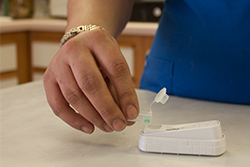Heartworm Testing

What is heartworm disease? The disease develops when a pet becomes infected with parasites called Dirofilaria immitis that are transmitted through the bite of an infected mosquito. Heartworms are “foot long” worms that live in the heart and major blood vessels of the lungs. Heartworm disease is spread by mosquitoes to both dogs and cats. It is especially a problem in the hot and humid parts of our country.
In dogs, signs of heartworm disease may include a mild persistent cough, reluctance to exercise, fatigue after moderate activity, decreased appetite, and weight loss. As heartworm disease progresses, pets may develop heart failure commonly recognized by an accumulation of fluid in the abdomen giving the pet the appearance of a "swollen belly." Dogs infected with large numbers of heartworms can develop a sudden blockage of blood flow within the heart leading to a life-threatening form of cardiovascular collapse called caval syndrome. Signs of caval syndrome include a sudden onset of labored breathing, pale gums, and dark bloody or "coffee-colored" urine. Without prompt surgical removal of the heartworm blockage, few dogs survive.
In cats the presence of just one or two worms can lead to severe respiratory symptoms and even death. The symptoms in a cat can easily be confused with a respiratory infection like pneumonia or “asthma-like” symptoms with wheezing or shortness of breath. Other than supportive care, there is no approved, safe treatment for heartworm-infected cats.
If your dog tests positive for heartworms, unfortunately the treatment is intensive and long. The medical compound used is actually a dangerous drug that is dosed specifically for your animal. Your pet will be kept on a strict exercise regime during treatment. Unlike intestinal worms, heartworms are not easily removed from the body. As the medicine kills the heartworms, the dog’s immune system works steadily but slowly to remove the worms.
The best treatment for heartworms is prevention of heartworms! All Creatures Veterinary Clinic provides the best preventative medicine available located in our clinic. These include yummy treats, pills or injectable medicine that can last up to six months. Your doctor will always recommend the best method for your dog at his regular appointment. Call All Creatures Veterinary Clinic to set up an appointment to test and treat heartworms.